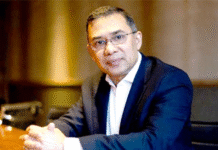Faruque Ahmed
BNP leaders have alleged that the process of Parliamentary election manipulation has started rolling. The Election Commission (EC) has taken highly controversial moves to destroy a level playing field for the opposition providing the ruling party a clear advantage to win the election. Meanwhile, the senior government leaders at a conference with the Deputy Commissioners in Dhaka recently asked them to make preparations for the polls. This prompted the opposition leaders to suggest that it was a clear move to rig the next election.
This is indeed a strange country where the ruling party leaders are preparing to hold the national election unilaterally keeping the opposition out of the race. Information Minister Hasanul Haq Inu has recently explained it differently saying that BNP will join the polls only at a time when the situation would be ensured for the opposition will lose.
Meanwhile, BNP led 18-party alliance has protested the EC’s move to change the election rules and also changing certain provisions of RPO (representation of public office ordinance) for ensuring that the ruling party will beat the opposition. Some of the changes include permission to allow the Prime Minister to stay in power with at least 20 advisers to conduct the polls. The Prime Minister and her team will also be eligible to run for election sitting in office and also have the power to campaign for other candidates and run the election machinery of the party. There will be an expenditure ceiling in case of every candidate but the EC has proposed to remove the ceiling on expenditure of the party chiefs in running the election campaign for the party as a whole. It means unaccounted expenditure on the part of the ruling party.
In the meantime, the government has approved several rural development projects costing crores of taka to build new roads, culverts and market places. The Planning Commission has also approved extension of the government’s ‘one house-one farm’ project last week at a cost of over taka 1600 crore. The opposition fears that the government is likely to misuse the fund and divert towards the electioneering process.
Changes in election rule
Another change in the election rules will provide the political parties the right to nominate and withdraw the candidacy of a person in the polls. Under it, the party will submit nomination papers to the EC and withdraw it if it felt necessary. The candidates will have no choice in this case and there will have no room for any party member to contest as independent candidate. The EC has taken the move to screen out the chance of rival candidates from political parties, and this rule change appears to particularly aim at stopping rival candidates from Awami League and its grand coalition partners to challenge the party nominees.
Another change suggested is to hand over the EC’s power to the court to cancel the candidature of a contestant for gross violation of election rules. It is an important instrument in EC’s hand to control the unruly behaviors of candidates and the shift of the authority to the court will indeed make the EC weaker at a time when it requires more power to reign in violent activities which may dominate the forthcoming elections. BNP leader MK Anwar said the EC should understand that it can’t go for such changes which will strengthen the government’s hand to rig the election. If the changes were implemented, the opposition will launch movement against the commission for its replacement.
This is how the whole government machine is being reorganized to manage the next Parliamentary polls with all organs of the state and bureaucracy tuned to bring back the Hasina government to power. The fight for power is a democratic practice everywhere but under a strictly maintained level playing field for all through effective election rules and regulations. But violence very often overtakes the practice and so many violent-prone countries in the recent past have agreed to set up neutral caretaker government or interim government led by highly credible persons to run the poll-time government.
CTG becoming popular
Most South Asian countries have adopted some form of transitional government to make the election credible and acceptable at home and abroad. Pakistan has held its election in May this year under a caretaker Prime Minister. Nepal has set up such a transitional government. Likewise, Bhutan held its recent election under a transitional government. Maldives president has proposed to set up such a transitional government to run its scheduled election in September this year.
Even in Bulgaria, the Parliament has set up a transitional government replacing the incumbent Prime Minister to hold the election early this year. In Greece, two caretaker governments held elections in 2011 and 2012 respectively in the otherwise economically troubled and politically unstable nation. According to reports from Europe, Czech President Milos Zeman has also set up an interim government to defuse threats from lawmakers to block the cabinet’s legislation and budget plans amidst the continuous recession. Jan Fischer, the head of the Czech Statistical Office was sworn in as the head of the government to hold the early elections of 2009. He was supported by the two largest parties in parliament. The arrogance of power may only ruin the nation and the ruling party may also end up in losing the power.
At a time when all those countries are moving forward to hold polls under transitional administration, Bangladesh – which had, in fact, pioneered this system – is reversing it only to encourage violence and achieve the AL’s political ends to rig the poll. However, the arrogance of power may only ruin the nation and frustrate the ruling party at the end. It is not clear if the government can achieve its objective but most certainly it would subject the nation to a severe state of uncertainty risking an unconstitutional military take over.
Source: Weekly Holiday









